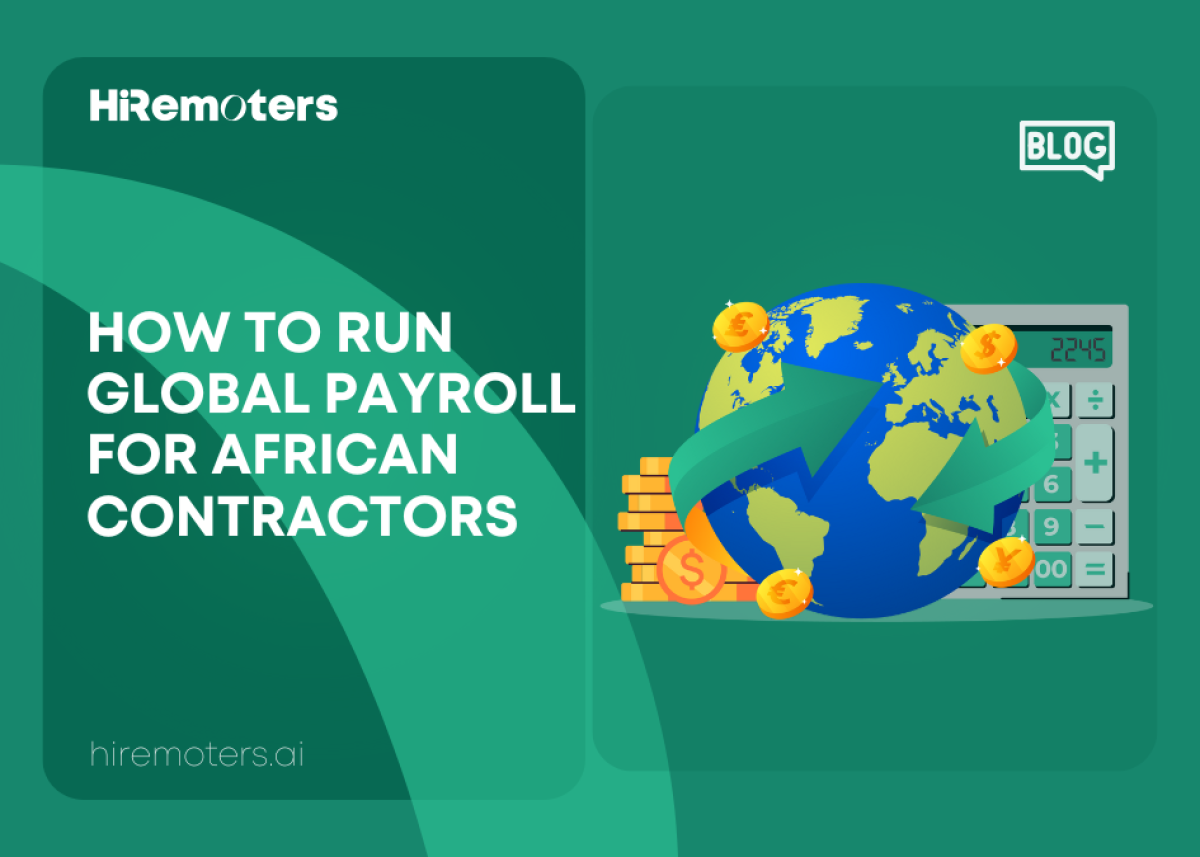
If your business is hiring talent across Africa, you already know the challenge: finding amazing contractors is the easy part. Paying them quickly, fairly, and in compliance with local rules? That’s where things get tricky.
The good news: you don’t need to be a payroll wizard to get it right. With the right setup, tools, and a bit of planning, running global payroll for African contractors can be smooth and stress-free—for you and for them.
Why Global Payroll in Africa Is Worth Figuring Out
Africa has one of the fastest-growing pools of skilled professionals. From software developers in Nigeria to designers in Kenya and marketers in South Africa, the continent is bursting with talent. Hiring here gives your business:
- Access to highly skilled professionals
- Competitive rates compared to other regions
- Fresh perspectives and diverse expertise
But here’s the catch: payroll isn’t just about sending money. Each country has its own rules, currencies, and systems. Without a plan, payments can get delayed, fees can pile up, and compliance headaches can follow.
Understanding How Payroll Works for Contractors
Before setting up payments, it’s worth clarifying how things work with contractors in Africa:
- Contractors vs. Employees: Contractors manage their own taxes and benefits. You don’t handle deductions like you would for employees.
- Country-Specific Rules: Every country is different. For example, Nigerian contractors might need special tax reporting, while Kenyan contractors contribute to national funds.
- Payment Preferences: Some contractors want bank transfers, others prefer mobile money or digital wallets.
Knowing this upfront saves a lot of back-and-forth later.
Common Payroll Challenges Across Africa
Paying contractors across multiple African countries can be a minefield. Here are the big four challenges most companies run into:
1. Currency and Exchange Rates
Your contractor might invoice in USD, but they get paid in their local currency. Fees and exchange rates can eat into their pay.
2. Banking Access
Not everyone has an international bank account. Mobile money (like M-Pesa in Kenya) is often more reliable than traditional banks.
3. Tax Compliance
Misclassifying workers or missing tax obligations can get your company in trouble.
4. Payment Delays
If payments are slow, contractors might not stick around long-term.
Smart Practices to Make Payroll Easier
Here are some practical ways to simplify global payroll for African contractors:
- Centralize Your Payroll – Avoid juggling multiple apps. A global payroll platform keeps everything in one place.
- Offer Multiple Payment Options – Bank transfers, mobile money, Payoneer, Wise, or PayPal—give your contractors choices.
- Stay on Top of Compliance – Use software or local partners who know tax laws inside out.
- Talk About Currency Upfront – Decide together whether payments will be in USD, EUR, or local currency.
- Keep Clear Records – Store contracts, invoices, and proof of payments for both your peace of mind and legal safety.
Best Payment Methods for African Contractors
Contractors care about getting paid quickly, with as little money lost to fees as possible. Popular methods include:
- Bank Transfers – Secure but often expensive and slow.
- Mobile Money – Huge in Africa, especially in East and West Africa. Great for contractors without bank accounts.
- Digital Wallets – Payoneer, Wise, and PayPal are common and often cheaper.
- Crypto Payments – Some contractors are open to stablecoins like USDT, especially where banking is limited.
Tip: Offer at least two methods. Flexibility builds trust.
Staying Compliant With Local Laws
The toughest part of global payroll in Africa is compliance. A few things to keep in mind:
- Classify Correctly: Don’t treat contractors like employees unless you’re ready to manage employment taxes.
- Write Clear Contracts: Outline payment terms, scope of work, and responsibilities.
- Know Tax Requirements: Some governments require reporting foreign contractor payments.
- Use Local Partners: Payroll advisors in Africa can save you time (and fines).
Why a Global Payroll Platform Helps
If you’re managing more than a couple of contractors, payroll platforms are lifesavers. They can:
- Handle multiple currencies
- Process mass payments in one click
- Integrate with mobile money systems
- Keep you compliant automatically
Think of it as outsourcing the headaches so you can focus on the work that matters.
Step-by-Step: Setting Up Payroll for African Contractors
Here’s a straightforward roadmap:
- List Your Contractors’ Countries – This tells you what rules you need to follow.
- Choose a Payroll Model – Direct contracts or use an Employer of Record (EOR).
- Pick Payment Methods – Offer a mix of global and local options.
- Draft Strong Contracts – Make sure they work for both sides and comply with laws.
- Automate Payroll – Less manual work, fewer mistakes.
- Review Regularly – Laws and fees change. Stay updated.
Quick Examples: Kenya and Nigeria
- Kenya: M-Pesa dominates. Many contractors prefer USD payments but want an agreed exchange rate to avoid disputes.
- Nigeria: Contractors often prefer USD into domiciliary accounts. Digital wallets like Wise and Payoneer are also common because of lower fees.
Both countries show why flexibility is key.
The Future of Payroll in Africa
Payroll across Africa is evolving quickly:
- Fintech Expansion – New startups are making cross-border payments faster and cheaper.
- Digital Banking – Multi-currency accounts are becoming more available.
- Crypto & Blockchain – Expect more borderless payment options where currencies are unstable.
Companies that adapt early will have an edge in hiring and keeping African talent.
Final Thoughts
Running payroll for African contractors doesn’t have to be complicated. With clear contracts, flexible payment options, and the right tools, you can keep your team happy and your business compliant.

Build, Scale, and Manage Your Global Teams with HiRemoters
Whether you're growing globally or managing local teams, HiRemoters makes HR and payroll seamless across regions, time zones, and every step of the way with the support you can count on.


